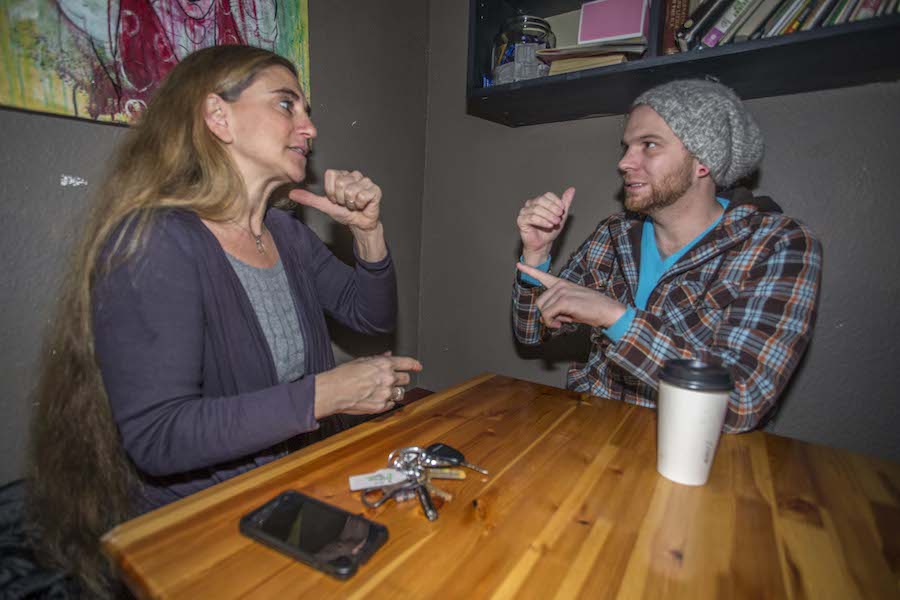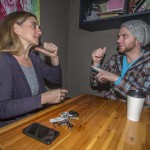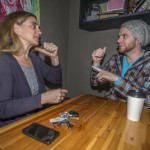- Dawn Drusin, left, and Blaine Crockford discuss coffee at BattleCat Coffee Bar in West Asheville.
Photo credit: Alicia Funderburk
It was one of her first assignments, and Rebecca Poulter was nervous. “When you’re first starting out, it’s like, ‘How can I do this and make this clear?’” she remembers. Poulter was asked to attend a Boy Scout meeting and interpret for a young boy who was deaf. She remembers feeling surprised when one of the Scout leaders made a joke. Everyone was laughing — including the boy — thanks to Poulter’s interpreting. “He got it and laughed along with everybody else,” she says. “He wasn’t left behind.”
In 2010, it was estimated that more than 32,000 people over the age of 18 are deaf or have some form of hearing loss in Buncombe County. That number has likely gone up in the last few years, according to Kathleen Speckhardt, the interpreting- services specialist at the Asheville Regional Center for the Deaf and Hard of Hearing. Heredity, medications, high fevers, overexposure and loud noises can all cause hearing loss. And sometimes, people don’t know the cause. Such is the case with Marilyn Edwards, who works in the same office as Speckhardt as the telecommunications consultant. Edwards lost her hearing at an early age due to nerve damage from uncertain causes.
She’s hardly alone. Indeed, a host of local groups and organizations exist for folks who are deaf or hard of hearing, such as the Asheville-based Smokey Mountain Deaf Club. Edwards is the secretary for the club, which serves as a “social, cultural and educational gathering for our Western North Carolina deaf community,” she says.
In 2010, 16.2 percent of adults in North Carolina were living with hearing loss. By 2030, this number is expected to grow to 41 percent. According to a study published in the Journal of American Medical Associations in 2010, hearing loss is particularly on the rise among teenagers. With more than 1 million people who are deaf and hard of hearing in North Carolina, the state has a total of 450 licensed interpreters — 32 of them are located in WNC.
Dawn Drusin has been interpreting in the Asheville area since 2006. She has an educational interpreter performance assessment (EIPA) certification and is one of the few interpreters in the region who is qualified to interpret classroom content. For some assignments, Drusin will spend Monday through Friday interpreting the teacher’s instruction for a student who is deaf.
North Carolina has two residential schools for deaf students, in Morganton and in Wilson, but the state used to have a third. In 2000, the Central N.C. School for the Deaf in Greensboro was closed due to declining enrollment. This means more children who are deaf are learning alongside hearing students in a “mainstream” classroom setting, which, Drusin says, only heightens the need for professional interpreters. “Without a qualified interpreter, the deaf child in the mainstream classroom is not getting the amount of education they need,” she says. “A deaf child should have just as much education as any other mainstream child.”
Education is only one area of focus on a long list of situations and events that may call for an interpreter. Drusin, for example, has interpreted in classrooms from preschool to college and at parent-teacher meetings. She has also interpreted at doctor’s appointments, staff meetings and counseling appointments. She interpreted at the Avett Brothers concert in 2010 at the Civic Center and for an Asheville Zipline Canopy Adventure. She has helped people buy cars and purchase eyewear. Hospitals sometimes call her in the middle of the night for sicknesses, traumas, pregnancies and surgeries.
“Any time someone who is deaf wants to access a service that is accessed by anybody, if they want that service too, they can request an interpreter,” Speckhardt says. Interpreters are not always the first option, she says, but it is usually better for people who are deaf and hard of hearing to have them.
It is the responsibility of the person or the venue providing the service to pay for the interpreter. If someone is refused an interpreter, they have the right to file a complaint with the Department of Justice. “Some people just don’t understand it’s an accommodation that is necessary,” Speckhardt says. “It’s like wheelchair ramps, but this is an upfront cost, rather than a hidden cost.”
Everyone has their own preference for how to communicate, and this preference should be respected, according to Poulter, who says that it is a common misconception that those who are deaf and hard of hearing can read lips. “There are some folks who don’t have experience with the deaf community,” she says. “It might be a long time before you meet someone who is deaf. … It is often thought, ‘Well, can’t they read lips?’ No, not everybody’s the same. Sign language might be their first language.”
Interpreting is no easy gig, and those in the field are held to high expectations. After receiving either an associate degree or a bachelor’s degree in interpreting, interpreters take an assessment tool to determine their skill level. After starting work as an interpreter, they maintain their certification through regular reassessments, according to N.C.’s licensure law. “The law makes sure that people, agencies and companies know they are hiring qualified interpreters,” Edwards says.
The qualifications and certifications of interpreters have been brought into question more often in light of the fraudulent interpreter incident at the Nelson Mandela service, according to Speckhardt. “It puts doubt on [interpreters] when people are hiring, and that’s sad,” she says. “But some good has come of it, because people are asking if they are hiring qualified deaf interpreters.” Interpreters must also follow a code of conduct, says Speckhardt, which includes standards like only accepting a job you are qualified for, which, she notes, the interpreter at Mandela’s memorial service failed to do.
Another ethical code that interpreters must adhere to is maintaining impartiality. “We don’t insert our opinions [when interpreting],” Poulter says. “We have to be true to the message.” The role of the interpreter is to keep everyone on the same page, she says. “Equal access is important. Everyone should be an equal participant and know what’s going on, can enjoy and participate, whether it’s in the classroom, the doctor’s office or in community projects.”
— micahwwilkins@gmail.com





I have had contact with Dawn Drusin. She practices very poor ethics…ALWAYS inserting her opinion, which she believes to be the only relevant one in the room. MountainX you should have done better research.